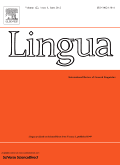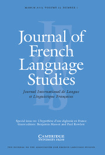
SPRACHWISSENSCHAFT
Scope & Guideline
Exploring the Boundaries of Language and Thought
Introduction
Aims and Scopes
- Historical Linguistics:
The journal extensively covers historical developments in the German language, including Old High German and New High German, exploring linguistic changes over time. - Dialectology:
Research on regional language variations, dialectal differences, and their social implications forms a significant part of the journal's scope. - Lexicography and Language Documentation:
The journal emphasizes lexicographic practices, including the documentation of word meanings, usage, and changes in semantic fields. - Corpus Linguistics:
Utilizing corpus-based methodologies, the journal analyzes language use in various contexts, including social media and historical texts. - Sociolinguistics:
The journal explores the intersection of language and society, including discussions on language dynamics, identity, and social change. - Morphology and Syntax:
Investigations into the structural aspects of language, including inflection, word formation, and sentence structure, are prevalent in the journal's publications.
Trending and Emerging
- Language and Identity:
An increasing focus on how language reflects and shapes individual and group identities, particularly in multilingual contexts, is evident in recent publications. - Digital Linguistics:
Research exploring language use in digital contexts, including social media and online communication, has gained traction, reflecting the importance of digital platforms in contemporary language dynamics. - Language Change and Variation:
There is a notable increase in studies addressing the dynamics of language change and variation, particularly in relation to social factors and community practices. - Gender and Language:
Emerging discussions on gendered language use and the social implications of gender in linguistic practices are becoming more prevalent, indicating a growing awareness of inclusivity in language. - Neologisms and Language Evolution:
The investigation of new words and expressions, particularly in response to social changes and technological advancements, is trending, showcasing the fluidity of language.
Declining or Waning
- Traditional Grammar:
Research focusing solely on traditional grammatical rules without considering contemporary usage or sociolinguistic factors appears to be declining, as the journal increasingly embraces more dynamic approaches to grammar. - Prescriptive Linguistics:
There seems to be a waning interest in prescriptive approaches to language, which emphasize 'correct' usage over descriptive studies that account for actual language practice. - Purely Theoretical Linguistics:
Theoretical discussions that do not incorporate empirical data or practical applications have become less common, as the journal favors studies grounded in real-world language use. - Historical Text Analysis without Contextualization:
Studies of historical texts that do not connect findings to broader social, cultural, or linguistic contexts are becoming less frequent, indicating a shift towards more integrative approaches.
Similar Journals

DEUTSCHE SPRACHE
Exploring the Depths of German LinguisticsDEUTSCHE SPRACHE, published by Erich Schmidt Verlag, is a pivotal journal dedicated to the intricate study of the German language. With its ISSN 0340-9341 and E-ISSN 1866-5233, this publication serves as a vital resource for linguists, educators, and language enthusiasts alike. Spanning diverse topics within the fields of linguistics and language, psychology, and social sciences, the journal has earned a Q3 ranking in Linguistics and Language, alongside a Q4 ranking in both Psychology (miscellaneous) and Social Sciences (miscellaneous) as of 2023. Although the journal is not Open Access, it provides invaluable insights on the developments in German language research from its convergence years of 2002 to 2011 and 2017 to 2023. Positioned in Berlin-Tiergarten, Germany, DEUTSCHE SPRACHE continues to expand its influence and accessibility to researchers, professionals, and students keen on understanding the nuances of linguistic expression in the German language.

Estudios de Linguistica-Universidad de Alicante-ELUA
Advancing Linguistic Knowledge for a Global AudienceEstudios de Linguistica-Universidad de Alicante-ELUA is a distinguished academic journal dedicated to advancing the field of linguistics, published by Universidad de Alicante. With an Open Access model adopted since 2020, ELUA facilitates greater accessibility to pioneering research for scholars and enthusiasts alike. The journal's ISSN is 0212-7636 and its E-ISSN is 2171-6692, ensuring it is indexed and easily discoverable in academic databases. Though the journal's H-Index is currently not specified, its commitment to disseminating high-quality linguistics research positions it as a valuable resource for researchers, professionals, and students. The journal aims to foster scholarly dialogue and innovation in various linguistic domains, making it an essential platform for sharing insights and findings that shape contemporary linguistic studies. Based in Alicante, Spain, ELUA is poised to contribute significantly to the global linguistics landscape.

Voprosy Yazykoznaniya
Innovating Perspectives in Language and SocietyVoprosy Yazykoznaniya, published by the esteemed Russian Academy of Sciences and the State Academy of Humanities (GAUGN), stands as a leading journal in the field of linguistics and language studies. With an impressive Q2 rank in Linguistics and Language for 2023 and a strong position within Scopus rankings, this journal fosters scholarly dialogue and pushes the boundaries of linguistic research by providing a platform for innovative studies, reviews, and analyses. Although not open access, its publication ensures high academic standards and visibility within the global academic community. Researchers, professionals, and students alike can benefit from the rich insights and diverse perspectives presented in this journal, serving as a vital resource for anyone interested in the intricacies of language and its role in society. Operating since 2009 and continuing to 2024, Voprosy Yazykoznaniya is an essential reference point for contemporary linguistic scholarship in the Russian Federation and beyond.

Rasprave
Exploring the dynamics of language and society.Rasprave is a distinguished open access journal published by the Institute of Croatian Language and Linguistics in Croatia, dedicated to advancing the field of linguistics and language studies. With an ISSN of 1331-6745 and E-ISSN 1849-0379, the journal has embraced open access since 2007, making its research widely available to scholars globally. It holds an important position in the academic community, particularly noted for its 2023 Scopus ranking within the Arts and Humanities and Social Sciences categories, falling into the 59th and 56th percentiles respectively. The journal’s impact is further reflected in its Q3 quartile ranking in linguistic and language studies, showcasing its relevance and growing influence in this vibrant field. Rasprave aims to publish innovative research that deepens understanding of language dynamics, linguistic theory, and sociolinguistics, making it an essential resource for researchers, professionals, and students seeking to enrich their knowledge and contribute to the academic discourse surrounding language.

Revista de Investigacion Linguistica
Championing high-quality research in the heart of Spain.Revista de Investigacion Linguistica is a distinguished open-access journal dedicated to the exploration and advancement of linguistic research, published by the University of Murcia since its inception in 1997. With the ISSN 1139-1146 and E-ISSN 1989-4554, this journal serves as a vital resource for linguistics scholars and enthusiasts around the globe. Located in the vibrant city of Murcia, Spain, the journal aims to foster academic discourse by disseminating high-quality research that covers a broad spectrum of linguistic topics, including syntax, semantics, phonetics, and sociolinguistics. Its commitment to open access ensures that knowledge is freely available, promoting a wider reach and impact in the academic community. By contributing to the advancement of linguistic studies, the Revista de Investigacion Linguistica plays a crucial role in shaping contemporary linguistic theories and practices, making it an essential publication for researchers, professionals, and students alike.

LINGUA
Advancing the frontiers of linguistic research.LINGUA is a premier academic journal dedicated to the field of linguistics, published by ELSEVIER and based in the Netherlands. With an ISSN of 0024-3841 and an E-ISSN of 1872-6135, this esteemed journal has garnered a reputation for excellence, evidenced by its position in the top Q1 quartile in Linguistics and Language as of 2023. LINGUA serves as a vital platform for scholars, researchers, and students, showcasing innovative research and critical discussions across various linguistic subfields. The journal has demonstrated impressive Scopus rankings—151 out of 1088 for Language and Linguistics, and 176 out of 1167 in Social Sciences—placing it in the 86th and 84th percentiles, respectively. By providing a forum for the dissemination of advanced linguistic theories and their applications, LINGUA continues to significantly contribute to the academic community, making it an essential resource for anyone engaged in the study of language.

Revue Roumaine de Linguistique-Romanian Review of Linguistics
Elevating Linguistic Scholarship to New Heights.Revue Roumaine de Linguistique-Romanian Review of Linguistics, published by EDITURA ACAD ROMANE, is a distinguished journal dedicated to advancing the field of linguistics and promoting scholarly discourse in language-related research. With its ISSN 0035-3957, this journal has established itself as a valuable resource for researchers and practitioners alike, particularly within the linguistics and language categories where it holds a respectable Q3 ranking as of 2023. The journal covers a wide array of topics, focusing on both theoretical and applied linguistics, making it an essential platform for those interested in the latest developments, methodologies, and findings in the field. Although it currently does not operate under an open access model, the Romanian Review of Linguistics remains an impactful publication with its regular convergence of years from 2010 to 2023, providing a comprehensive archive for ongoing research endeavors. With its address located in Bucuresti, Romania, this journal continues to foster a vibrant academic community and supports the ongoing exploration of linguistic phenomena across diverse contexts.

Journal of French Language Studies
Connecting Scholars through French Language ExplorationJournal of French Language Studies, published by Cambridge University Press, is a prestigious and leading journal in the field of linguistics and language that provides a platform for scholarly articles and research findings relevant to the French language and its various dimensions. With an impressive Q1 ranking in the 2023 categorization and ranked #257 out of 1088 in Scopus for Language and Linguistics, this journal plays a pivotal role in advancing the study of French linguistic methodologies, sociolinguistics, and applied linguistics. Since its inception in 1991, the journal has continually contributed to the academic community, attracting innovative investigations and theoretical discussions that enrich understanding and research in the field. Researchers and students enjoy comprehensive access to critical analysis and emerging trends, and as it continues to converge towards 2024, the journal promises to remain an essential resource for exploring the evolving landscape of French language studies.

Cadernos de Estudos Linguisticos
Fostering collaboration in the realm of linguistic research.Cadernos de Estudos Linguisticos, published by UNIV ESTADUAL CAMPINAS, INST ESTUDOS LINGUAGEM, stands as a pivotal platform in the field of linguistic studies since its inception in 1978. With its commitment to Open Access, this journal fosters the dissemination of cutting-edge research, ensuring that knowledge is accessible to a global audience. This also enhances collaboration among researchers, professionals, and students dedicated to exploring the nuances of language. The journal proudly carries the ISSN 0102-5767 and E-ISSN 2447-0686, attesting to its uninterrupted quality and relevance in linguistic scholarship. By addressing various facets of language studies, including syntax, semantics, and sociolinguistics, this esteemed journal is a vital resource for advancing understanding and innovation in the field.

RUSSIAN LINGUISTICS
Illuminating the intersections of language and psychology.RUSSIAN LINGUISTICS is a peer-reviewed academic journal published by Springer, dedicated to advancing the understanding of the Russian language and its interplay with various linguistic frameworks. With a longstanding history that spans from its inception in 1974, the journal encompasses a broad range of topics within the fields of linguistics and language studies, offering valuable insights especially in *Developmental and Educational Psychology* and the intricacies of linguistics at large. Currently ranked in the Q2 quartile for Linguistics and Language, and holding substantial positions within Scopus rankings, RUSSIAN LINGUISTICS serves as an essential resource for researchers, educators, and students alike, fostering dialogue and collaboration within the international linguistic community. The journal notably provides critical access to research findings that enhance the comprehension of Russian linguistics' role in a global context, despite operating under a traditional access model. For those pursuing scholarly excellence, RUSSIAN LINGUISTICS remains a pivotal platform for disseminating innovative research and promoting the study of language.